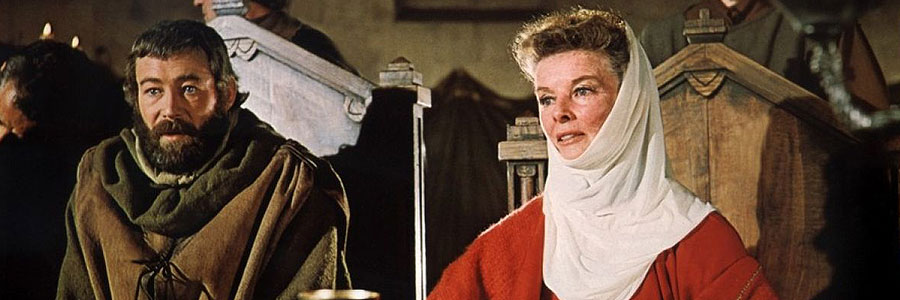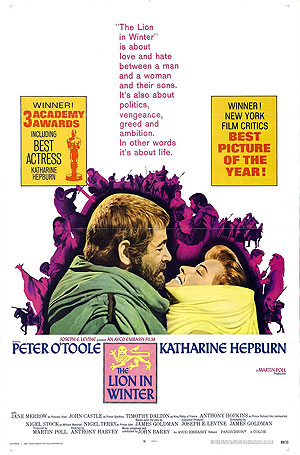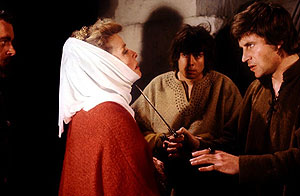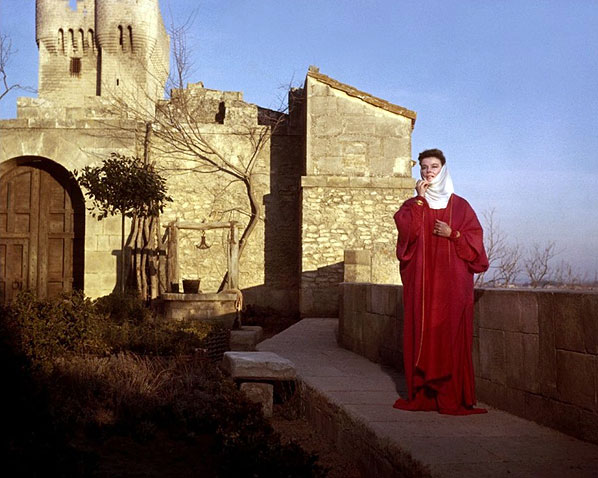
The Lion In Winter

THE LION IN WINTER (MOVIE)
Avco Embassy Pictures
Original release: October 30th, 1968
Running time: 134 minutes
Director: Anthony Harvey
Writers: James Goldman
Composer: John Barry
Cast: Peter O’Toole, Katherine Hepburn, Anthony Hopkins

The death of Peter O’Toole continued the further thinning of a legendary generation of hell-raising, wonderfully eloquent actors steeped in British theatrical history. Like Oliver Reed, Alan Bates and the Richards Burton and Harris, there’ve always been accusations that the booze and womanizing led to a dissipation of talent and that the cinematic output was as a result not what it could’ve been. However, such puritanical counterfactuals often prove churlishly ill-informed. If O’Toole had died immediately following Lawrence Of Arabia (1962), he would already have made his impact on cinema history, a fact he pointed out himself during interviews.
Set over the Christmas week of 1183, The Lion In Winter depicts Henry II (O’Toole) as he gathers his family together at a castle in Anjou, France, where he wishes to settle the thorny issue of his succession. His wife Eleanor (Katherine Hepburn) is summoned from prison and arrives on a barge. Henry wishes his youngest son John (Nigel Terry) to succeed him. He’s a thick spoilt boy Henry loves nevertheless.
The eldest son Richard (Anthony Hopkins in his debut role) allied with his mother, refuses to accept this, threatening an armed revolt if the decision goes against him. Jeffrey (John Castle) is a Machiavellian schemer whose plots are so complex and shifting that it’s difficult to work out what he actually wants, other than perhaps to be noticed: ‘You never thought about me much’ he complains to his father, only to be told, ‘I never thought about you at all.’ To complicate matters further, King Philip (Timothy Dalton debuts) of France is visiting to resolve a treaty promise relating to Henry’s lover Alais (Jane Merrow), who he will perhaps have to marry to his son, if he doesn’t marry her himself.

The complicated plot and theatrical origin of the film (adapted from his own play by James Goldman) makes for something similar to a bedroom farce, and though never tongue in cheek as such, there’s an icy ironic self-awareness throughout proceedings. One scene has all three brothers enter separately only to hide one after the other behind different tapestries and eavesdrop on the subsequent dialogue. The overt theatricality, however, allows for some glorious exchanges and Hepburn and O’Toole in particular revel in their spats in a way Elizabeth Taylor and Richard Burton had two years earlier in Who’s Afraid of Virginia Woolf? (1966)
Playing Henry for the second time in his career – the first was opposite Burton in the equally brilliant Becket (1964) – O’Toole sinks his teeth into the dialogue and the scenery. His King is a grizzled old man, full of regret and baffled wonder at his own aging, fighting his mortality as much as his rivals. The love/hate that inspires all of his relationships is most acutely present in his blisteringly entertaining rows with Eleanor and in Hepburn there is an actress of the stature able to withstand the grandstanding and grandstand herself. She would win an Oscar for the role. Henry compares himself to Lear and the wonderful baroque and smart as a whip dialogue is laced with a drily self-aware wit which aims high: ‘I’m villifying you for God’s sake – pay attention!’
O’Toole was the kind of actor who could vilify and be urbane at the same time. And my God, we paid attention.


John Bleasdale
John Bleasdale is a writer based in Italy. He has published on films at various internet sites and his writing can be found, along with blog posts, collected at johnbleasdale.com.
He has also contributed chapters to the American Hollywood and American Independent volumes of the World Directory of Cinema: (Intellect), Terrence Malick: Films and Philosophy (Continuum) and World Film Locations: Venice (Intellect). You can also follow him on Twitter @drjonty.
© 2022 STATIC MASS EMPORIUM . All Rights Reserved. Powered by METATEMPUS | creative.timeless.personal. | DISCLAIMER, TERMS & CONDITIONS
HOME | ABOUT | CONTACT | TWITTER | GOOGLE+ | FACEBOOK | TUMBLR | YOUTUBE | RSS FEED
CINEMA REVIEWS | BLU-RAY & DVD | THE EMPORIUM | DOCUMENTARIES | WORLD CINEMA | CULT MOVIES | INDIAN CINEMA | EARLY CINEMA
MOVIE CLASSICS | DECONSTRUCTING CINEMA | SOUNDTRACKS | INTERVIEWS | THE DIRECTOR’S CHAIR | JAPANESE CINEMA





